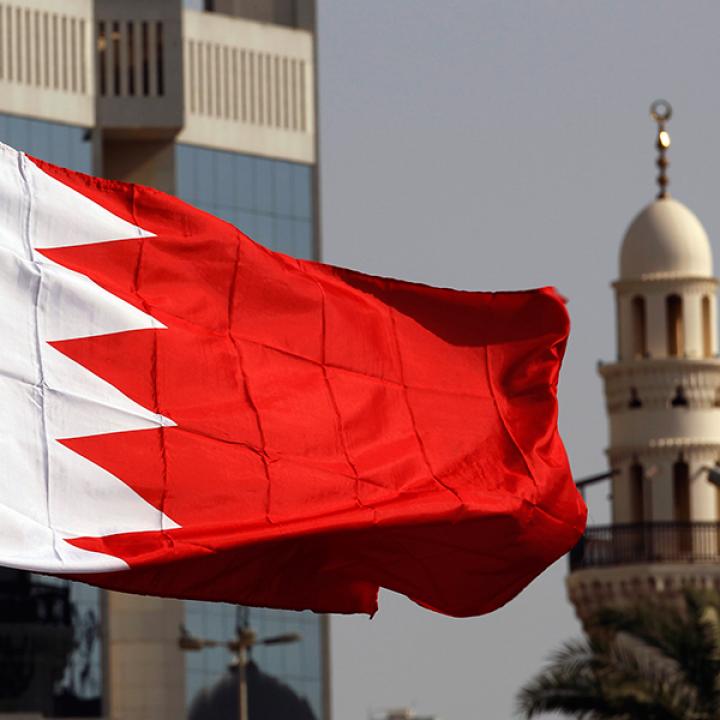

Manama is still grappling with the complex challenge of developing ties with Israel while coping with homegrown Shia militancy.
On May 6, Bahrain’s state news agency announced that Israeli Mossad intelligence chief Yossi Cohen had visited the Gulf island kingdom to discuss “ways of boosting cooperation and coordination, security issues, regional developments, and issues of common interest.” The word “Iran” went unmentioned, but it no doubt dominated Cohen’s conversations with the heads of Bahrain’s National Security Agency and Strategic Security Agency, reflecting the intimacy of bilateral ties since last year’s Abraham Accords.
Three days earlier, Bahrain’s handling of a related issue—tensions with elements of its marginalized Shia Muslim majority population, co-religionists of Iran—had come to the fore when the Interior Ministry invited the U.S. charge d’affaires and other senior foreign diplomats to visit Jau prison. Many of the country’s estimated 2,500 Shia detainees are held in this facility, known officially as the “Reformation and Rehabilitation Center.” In March, a coronavirus outbreak had led some prisoners to stage protests, spurring a security crackdown that prompted criticism in foreign media. After the May 3 visit, British ambassador Roddy Drummond tweeted, “We were shown a well-run facility, with good medical provision and measures against Covid...I welcome [the authorities’] engagement on difficult issues raised in the media. I support Bahrain’s intent to continue to reform its judicial and prison system, including more use of alternative sentences.”
The political pot was further stirred by a May 9 report regarding Sheikh Isa Qassim, Bahrain’s most senior Shia cleric, currently living in exile in Iran. He called for a constitution drafted by a parliament chosen in fair and free elections, implicitly questioning the results of the 2018 vote and, by extension, the Sunni royal family.
Although local demonstrations and acts of violence have decreased substantially in recent years, the relative quiet seems more a consequence of firm government action than any conciliation efforts. A 2011 uprising was put down savagely with armed support from Saudi Arabia and the United Arab Emirates. The rallying point of those protests, the Pearl Monument, was demolished, and the traffic circle around it was reconfigured, but tensions persisted. For years, the U.S. embassy website included a map marking Shia neighborhoods that American personnel were instructed to avoid, much to the irritation of Bahraini officials worried about the state’s image. The map has since been removed, but a 2020 security alert is still in effect advising caution for U.S. citizens “country-wide.”
In parallel to these tensions, royal family politics remain in flux following the November death of long-serving prime minister Khalifa bin Salman, uncle to King Hamad. Day-to-day running of the country has largely been delegated to two men: the new prime minister, Crown Prince Salman bin Hamad, who handles economic affairs, and his much younger half-brother Nasser bin Hamad, who is national security advisor. Yet King Hamad—whose personal focus on religious coexistence underpins Bahrain’s ties with Israel—seemingly rebalanced his sons’ portfolios on April 23, appointing Nasser as chairman of the investment arm of the National Oil and Gas Authority (NOGA), which acts as a sovereign wealth fund.
Notably, Salman is said to be comparatively liberal toward the Shia community and in favor of commuting the sentences of certain prisoners. By contrast, Nasser is associated with royal hardliners who favor a tough approach to Bahraini Shia and Iran.
For their part, U.S. officials are anxious to preserve the longstanding bilateral relationship, most obviously the base and headquarters that Bahrain provides for the U.S. Fifth Fleet, Naval Forces Central Command (NAVCENT), and the associated 10,000 resident personnel. The unstated mission of these forces is to protect U.S. interests and Gulf oil/gas exports from Iranian threats.
Meanwhile, the island’s budding normalization with Israel is fraught with potential sensitivities. Bahraini goods are beginning to appear in Israeli supermarkets, but Israelis intending to visit the kingdom when direct flights start next month may find less warmth from the citizenry than they have from the government, especially given recent clashes with Palestinians in Jerusalem. Hostility toward Israel is common among Bahraini Shia and Sunnis alike—after a group of rabbis visited four years ago, for example, Sunni activists symbolically washed a street where they had walked. Manama has found a way to manage these challenges successfully in recent years, but the careful balancing act may need to continue indefinitely.
Simon Henderson is the Baker Fellow and director of the Bernstein Program on Gulf and Energy Policy at The Washington Institute, and author of its 2019 succession essay “Bahrain After the Prime Minister.”



